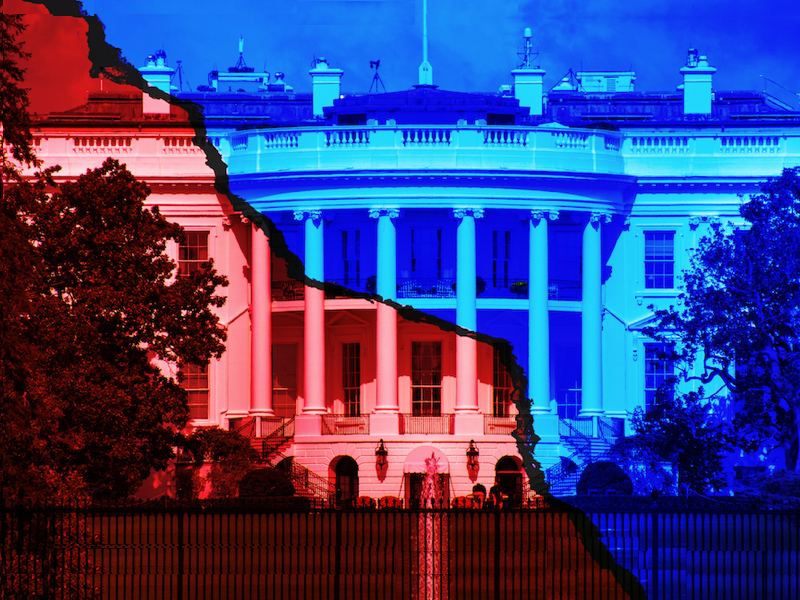

U.S. election special: What’s ahead for global markets
As transition teams get to work in Washington, D.C., Jack Manley of J.P. Morgan Asset Management offers a macro view of America’s new direction
- Featuring: Jack Manley
- November 7, 2024 November 18, 2024
- 16:40

(Runtime: 5:00. Read the audio transcript.)
**
The U.S. economy is a safe bet for investors, regardless of who is at the helm, says Jack Manley, vice-president, global market strategist with J.P. Morgan Asset Management.
On a special episode of the Soundbites podcast, Manley offered his take on Tuesday’s election of Donald Trump as the 47th President of the United States.
“We have to remember that red or blue or purple, unified or mixed government, over the long run, the U.S. economy grows,” he said. “Over the long run, the U.S. equity market grows.”
He pointed out that the S&P 500 returned about 16% per year under the Obama administration, about 16% per year under the Trump administration, and is averaging about 15% per year so far under the Biden administration.
“And all while the economy has grown between 2% and 2.5% annualized,” he said. “These are good numbers, regardless of the composition of government.”
Manley said that while it is important for investors to consider the policy implications of elections, investment decisions should be made independent of short-term political manoeuvres.
“History is a very good guide that if you are a long-term investor, a lot of this stuff is just going to become noise,” he said.
He said stock market investors responded to this week’s election with exuberance — possibly in anticipation of deregulation and of tax cuts, while discounting potential drags on the economy like a ratcheting up of price and wage pressures and increased fiscal stress.
“There’s a high likelihood of tariffs being imposed on most, if not all, of the United States’ trading partners,” he said. “That could end up being inflationary. Inflation could translate into a change in the interest rate outlook. And higher interest rates may put downward pressure on multiples.”
Similarly, he said anticipated tax cuts could deepen the federal deficit and increase the cost of servicing the national debt.
“These things don’t suggest outright bad news for the equity market,” he said. “But I do think that we’re probably going to see a little bit of volatility, a little bit of chop in the stock market over the next month or so.”
Manley said trading partners should bear in mind that the main intention of Trump’s tariffs would likely be to bring large trade imbalances back in line.
“China has the biggest trade deficit. Mexico, I believe, is the second biggest. Vietnam is the third biggest,” he said. “They are the greatest culprits, so to speak, when it comes to having an unfair trade balance with the United States.”
The impact of tariffs on Canada might be limited, he said, because not only is Canada further down the trade-imbalance list (it ranks seventh), but because a large portion of Canadian exports are in the form of energy.
“We simply do not have the infrastructure here in the United States to satisfy demand for energy products at the northern part of the country,” he said. “It’s a lot easier to pipe energy down from Canada than it is to pipe energy up from Louisiana or Texas or Oklahoma, or one of the big energy states in this country.”
More impactful to Canada could be the relaxation of regulations in the financial and energy sectors — where many Canadian companies are active.
“In the aftermath of the election, some of the biggest winners were financials and energy companies, clearly in anticipation of potential deregulation in these two areas,” he said.
On the financial side, he said we could see reduced capital requirements. And on the energy side, a lot of environmental regulation could be rolled back.
“The downside to this, particularly as it relates to Canada, is that if fossil fuel producers in the States have an easier time exploring and drilling and pumping, then we may see some downward pressure on energy prices,” he said. “And if we end up seeing a glut of U.S. crude or gas in the global marketplace, that could end up hurting producers in other regions.”
In terms of a portfolio response to the pending Trump presidency, he said it is important to anticipate heightened volatility along the interest rate curve.
“As markets continue to grapple with this idea of what an extension of the tax cuts and higher tariffs mean for debts, deficits and inflation, and how that translates into longer-term interest-rate policy, you probably want to shorten up a little bit on duration in your fixed-income portfolio,” he said, “at least over the short term.”
He cautioned, however, against getting caught up in the details.
“Keep your nose to the grindstone and think about things longer term,” he suggested.
**
This article is part of the Soundbites program, sponsored by Canada Life. The article was written without sponsor input.
